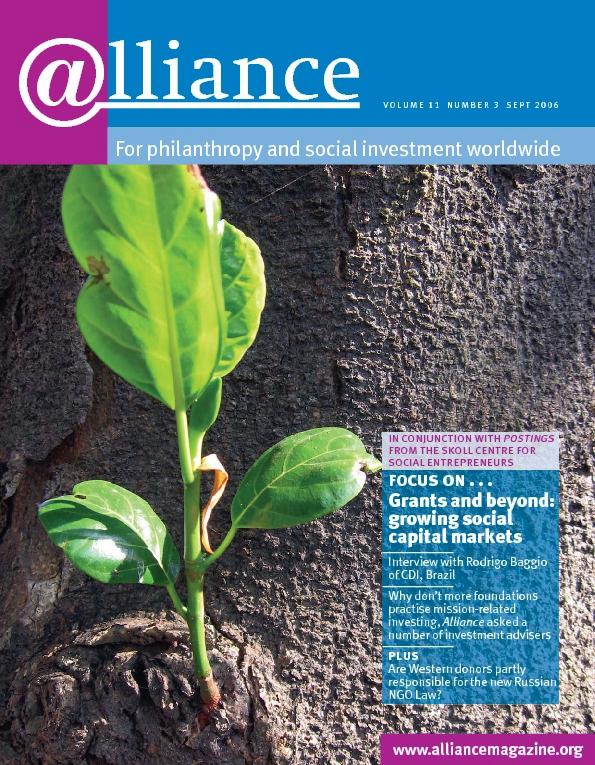In this extraordinary book, former World Bank senior research economist Bill Easterly goes to the heart of aid and finds it deeply flawed. Building his case systematically from hundreds of empirical studies and painstaking analysis (at times too painstaking for this non-economist!), Easterly argues that aid fails because those who are meant to reap the benefits are not in a position to hold those who administer and distribute aid to account.
What in democratic politics is decided by ballot, or in commerce by consumer choice, is complicated in the social change domain with elaborate systems of proxies that would not exist if those ‘in need’ had power. It is not unreasonable to view the entire set of aid’s institutional arrangements as an elaborate and largely dysfunctional attempt to ‘work around’ this bedrock reality.
Easterly’s thesis is this: a system of Planners without strong feedback or accountability is doomed to fail. Much of the detail of nearly 400 pages provides a brilliant analysis of how aid planners do work, and why they fail. He contrasts the Planners with the Searchers – the social entrepreneurs who solve problems on the ground with the resources around them.
The book is not thin on prescriptions, which seem to follow three themes. First, aid should eschew grand visions in favour of small, measurable targets, and be held accountable for them. He asks, ‘Will Gordon Brown be held accountable if the new wave of aid does not get twelve-cent medicines to children with malaria?’ Big Aid loves Big Messages and resists accountability. At the CIVICUS World Assembly in Glasgow, UK aid minister Hilary Benn repeatedly asserted that those governments receiving aid have to be more accountable to their people, completely ignoring the view from the floor – which was put to a vote and received overwhelming support – that the providers of aid need to be directly accountable to the citizens in countries receiving it.
Second, speaking from a specialist’s knowledge, Easterly proposes a series of creative ideas to reform evaluation practices. Third, he argues for innovation in accountability mechanisms, informal and formal, that enable the poor to hold aid programmes effectively to account.
Needless to say, at a time when the UN and some Western governments – notably the UK – are pushing hard for increased aid to reach the Millennium Development Goals by 2015, a book that blows the whistle on this whole top-down, outside-in approach to development has its critics.
There seem to be three main criticisms of the book. The first is with the problem diagnosis and goes like this: the world is a messy place and the facts don’t support a stark portrayal of aid failure. The real story is more nuanced. But proponents of this view – mainly those who make their living studying the aid system and extolling its nuances – agree that Easterly’s main points about feedback and accountability are critical to making aid better. The second criticism is that strengthening evaluation practices will lead to more bureaucracy, more Planners, not less. The third is that Easterly gives comfort to the enemies of aid. Easterly answers these and other criticisms, to my mind convincingly, in a debate with some of his critics on the Cato Institute website at http://www.cato-unbound.org/archives/april-2006/
Easterly’s excellent book is an important contribution to a growing consensus about how to fix aid. A new BOND study (available from September 2006 at http://www.bond.org.uk) on NGO quality offers a clear and bold message: the quality of aid is driven by the quality of relationships with intended beneficiaries. It offers practical suggestions as to how international development NGOs can renew their missions, re-tool their organizations, and achieve real quality (ie improvements in the lives of the poor) by focusing on feedback from and accountability to the poor.
For those of us who believe that aid should really be about empowering the poor – especially, as he reminds us, the Searchers who live and work among them – this consensus is good news. As Jed Emerson noted in his March 2006 Alliance Online interview, ‘People are dying while we try to figure this out, so we damn well better figure it out with more passion than we have in the past.’
Bill Easterly has made a passionate, well-argued contribution to ‘figuring it out’. The more people who read this book and absorb its message, the better.
David Bonbright is CEO of Keystone. Email david@keystonereporting.org
The White Man’s Burden: Why the West’s efforts to aid the rest have done so much ill and so little good
William Easterly Penguin Press $27.95
ISBN 9781594200373
To order
http://us.penguingroup.com



Comments (0)